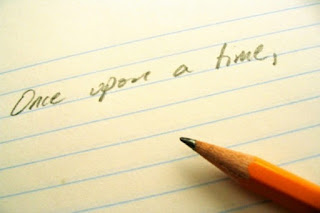I've been doing a lot of writing and a lot of thinking lately, and I decided that today it might be nice to not talk about the big concepts surrounding manuscripts and novels and such. Instead, let's zoom in on a very simple question I hear a lot: How do I become a writer? While the simple answer is, "Start writing," I want to get into some of the things that prompt people to ask this question, then branch out and find some answers that can put people on the right path.
Looking back over the many years to the point where I asked that question, I was fortunate. As I mentioned in my first-ever post on this blog, my pursuit to be a writer was driven by a need to tell stories. Not just my stories, not just funny or scary stories, but to share all the thoughts and ideas crashing around my brain. I started writing regularly before I asked the question of how I should do this. So, perhaps the more important question to ask is not how you should become a writer, but why you want to write. (Hint: If it's for the money, you might want to rethink your strategy.)There are a lot of reasons why you want to become a writer. For some - such as myself - it satisfies an urge to communicate and share. For others, it is an inward exploration that exposed a deeper reality or meaning of life. Some people like the idea of taking the world around them, then compacting it into words on a page in such a way that when someone else reads it, that world pops back to life like some secret encrypted message. And, of course, there is always that urge to build worlds of fantasy, to create alternate realities and never-before-imagined people and conversations, to explore the boundless worlds of the imagination. But let's face it - if you don't know what your reason why is, your feet are kind of stuck in the mud. Answer that question first.
Once you have the why, the how should be pretty straightforward: Start writing. By writing, I don't mean jump into creating your first novel, though you are welcome to try. I mean start turning your thoughts and ideas into words on a page. Go through the frustrations of trying to describe the clouds along the western horizon at sunset, or why a kitten's mewling sounds impatient. Start creating pages full of first attempts and little ideas, of little poems (yes, poems) and descriptions of a flower. Write about your first kiss or your first funeral, and drag the emotions of that moment onto the page, kicking and screaming. Write about what your senses can't perceive but your heart can't deny. Make a thousand mistakes on your way to writing that first little description that makes you pause and say, "Damn, that's good."
And no, it does not count if you've done all of that in your head and just need to put it on paper. Just like how a painting is often different than the image we see in our head, we need to translate our ideas into those individual words in that special order that gives them meaning and life, and it takes practice and effort. A lot of it. And as you do that, and your many worlds become sketches and poems and stories, you will see how writing is just as much art as anything you ever put effort into doing.
And then you are a writer.








